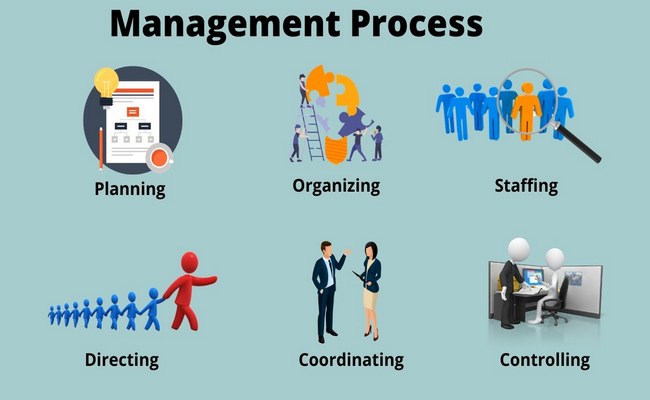What is meant by Management Process?
According to George R. Terry, management is a distinct process consisting of planning, organizing, actuating, and controlling performance to determine and accomplish objectives by the use of people and resources.
Management is totally concerned with seeing what the job gets. Its tasks center on planning and guiding the operations of an enterprise, according to E.F.L Brech.
According to Stanley Vane, management is the simple process of decision-making and control over the actions of human beings for the express purpose of attaining predetermined goals.
Management is that task or function of an enterprise that concerns itself with the direction and control of various activities attains business objectives, according to Spiegel.
Management consists of getting things done through others. A manager is that person who attains the targets by directing the efforts of others, according to S. George.

5 Principles of Management Process:
At first, Henry Fayol identified the functions of management like planning, organization, command, coordination, and control. Later, Luther expanded these functions or activities by introducing two more activities also. Those are planning, organizing, staffing, directing, coordinating, reporting and budgeting.
All these are again recognized by clubbing reporting and coordinating under the component of control and classified as five major elements or steps in the management process. Those are listed in the following:
- Planning,
- Organizing,
- Staffing,
- Directing,
- Controlling.
All the above elements or steps of the management process have discussed below:
1. Planning:
Planning is preparing a blueprint. Planning mentions thinking ahead of time and formulation of preliminary thoughts. In another word, it is a continuous intellectual process of determining philosophy, objectives, policies, procedures and rules and standards, long and short-term projected outcomes and fiscal course of actions, and managing planned change. This is the preliminary and most important step in the management process.
2. Organizing:
It is establishing the structure to carry out the plans. Determine the most appropriate type of patient care delivery in a health agency or educational programs in an institution. In simple, it is grouping the activities to meet its goal. Other functions involve- working within the structure of an organization, using power and authority appropriately, and understanding.
3. Staffing:
It is a process of assigning competent people to fill the appropriate nursing roles in an institution, designated for the organizational structure through hiring & orienting staff, recruitment & selection of staff, staff scheduling, staff development activities, and staffing often becomes part of organizing. Example: appointment of a Dean for the college of nursing, nursing superintendent for a hospital, or a head nurse for a hospital unit.
4. Directing:
It is a process involving many human resource management responsibilities such as motivating, communicating, managing a conflict, facilitating, collaborating, and coordinating the team.
5. Controlling:
It is an ongoing process to ensure that the activities of an institution or organization adhere to the plan. It includes performance appraisal, quality assurance, and fiscal accountability, legal, ethical and professional control.
More questions related to this article:
- What do you mean by management?
- Define management.
- What are the elements of the management process in nursing?
- What are the functions of the management process?
- Describe various ways of the management process.
- What are the steps in the management?
- Describe the steps in the management.
- What do you mean by management and its function?
- What are the five basic functions of management?
- What are the 5 principles of management?
- What are the 5 management theories?
- What is the most important function of management?

Maria Khatun Mona is a Founder and Editor of Nursing Exercise Blog. She is a Nursing and Midwifery Expert. Currently she is working as a Registered Nurse at Evercare Hospital, Dhaka, Bangladesh. She has great passion in writing different articles on Nursing and Midwifery. Mail her at “maria.mona023@gmail.com”
